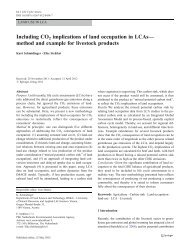production of animal proteins by cell systems - New Harvest
production of animal proteins by cell systems - New Harvest
production of animal proteins by cell systems - New Harvest
You also want an ePaper? Increase the reach of your titles
YUMPU automatically turns print PDFs into web optimized ePapers that Google loves.
Experts’ opinions (7): The most important criteria that have to be met in order<br />
develop marketable products<br />
• Cost competitiveness with a suitable product, and very careful attention to public relations and<br />
advertising. Doing this wrong could be a disaster that makes GM foods appear to be "organic"<br />
<strong>by</strong> comparison.<br />
• Low cost, safe and nutritious. Texture and taste <strong>of</strong> ground meat should not be a problem to<br />
duplicate, given what is already accepted <strong>by</strong> consumers.<br />
• Products should be attractive to the senses. Additionally the products should have a proven<br />
safety and the sustainability should be clearly demonstrated. There should also be a social<br />
acceptance <strong>of</strong> technological food <strong>production</strong>. To my opinion, this should be achieved <strong>by</strong> a<br />
transparent <strong>production</strong> process.<br />
• Societal obstacles are a very important issue. Many people react with emotional aversion on<br />
the subject <strong>of</strong> cultured meat. I will be very important to understand this aversion, and to<br />
investigate how it can be maximized and more importantly how it can me minimized.<br />
• There are quite a number <strong>of</strong> criteria that are very important for the success <strong>of</strong> a new product.<br />
These are consumer acceptance, taste, continuity <strong>of</strong> <strong>production</strong> (it should be available all year<br />
round), and it should be available at a competitive price.<br />
• Cost and consumer acceptance. Ethical concerns might be a point to consider.<br />
• To show the necessity to produce cultured meat and benefit for both consumer and<br />
environment.<br />
• The <strong>production</strong> <strong>of</strong> products with a good taste and ‘bite’,<br />
• Comparable prices with ordinary meat, safe, tasty, healthy and having a resemblance with an<br />
ordinary high-quality piece <strong>of</strong> meat.<br />
• Products have to be generated that the consumer will accept and wishes to buy.<br />
• The technology must have been developed to a large extent. Societal acceptance is very<br />
important.<br />
• Cost prize, equal or lower than real meat. Sustainability, significantly lower resource use per<br />
kg produced meat. Quality, equal or better taste etc. Public acceptance, avoid “Frankenstein<br />
food” image.<br />
• Consumer acceptance, ‘transparent’ <strong>production</strong> process, not too expensive.<br />
Opportunities. Man’s impact on the planet Earth has become alarmingly clear in the<br />
past decades. Numerous reports have been produced with frightening scenarios <strong>of</strong> the<br />
future and indeed without a change <strong>of</strong> policies there is a distinct possibility that our<br />
planet will become inhabitable. Energy consumption and the livestock sector in particular<br />
have been identified as the leading drivers <strong>of</strong> climate change, deforestation, pollution and<br />
reduction <strong>of</strong> biodiversity. Simultaneously, the livestock sector is extremely important for<br />
the agricultural economy and obviously for the human diet. Different solutions can, and<br />
should be, developed to reduce the environmental impact <strong>of</strong> this sector, one <strong>of</strong> those<br />
being the (partial) replacement <strong>of</strong> traditional meat with an edible product made from<br />
<strong>animal</strong> <strong>proteins</strong> produced <strong>by</strong> cultured <strong>cell</strong>s.<br />
The possibility <strong>of</strong> making an edible meat product from cultured <strong>cell</strong>s without the use <strong>of</strong><br />
<strong>animal</strong>s may provide a change in agriculture and society at large. The infrastructure that<br />
should accompany the implementation <strong>of</strong> such a technology is still lacking and has to be<br />
developed. At this point in time the Netherlands is considered to be the leading country<br />
with respect to the research on cultured meat. Although this notion may not be true, fact<br />
is that Dutch scientists have a very good reputation if it comes to food and agricultural<br />
37



